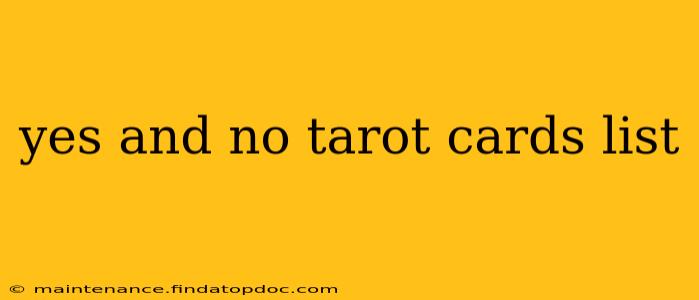The Tarot, often perceived as a mystical tool for complex divination, can also provide surprisingly straightforward yes or no answers. While nuanced interpretations are often preferred, understanding which cards lean towards a definitive "yes" or "no" can be incredibly helpful for quick readings or clarifying specific questions. This guide explores the cards most commonly associated with yes and no, examining their nuances and offering strategies for more accurate interpretations.
What Tarot Cards Typically Indicate "Yes"?
Several cards strongly suggest a positive response, but remember, context is key. Even these "yes" cards might need further clarification depending on the surrounding cards in the spread.
- The Sun: This card radiates positivity, joy, and success. A clear "yes" indicative of happiness and fulfillment.
- The Lovers: While signifying choices and relationships, a positive outcome is usually implied when asking about a decision's success. A "yes," but often with conditions or the need for balance.
- Three of Cups: This card points to celebration, community, and shared joy, suggesting a "yes" related to social connections or shared experiences.
- Ace of Cups: The Ace of Cups signifies new beginnings, emotional fulfillment, and abundance in love and joy. A positive "yes" signifying a fresh start.
- Ten of Pentacles: This card is a strong indicator of financial security, family harmony, and long-term success. A resounding "yes" related to prosperity and stability.
- Page of Cups: Often suggests good news, new opportunities, and creative endeavors. A "yes" related to potential and positive growth.
- Wheel of Fortune: While suggesting cyclical change, its appearance often indicates fortunate timing and a positive outcome, making it a conditional "yes."
What Tarot Cards Typically Indicate "No"?
Similarly, some cards often point towards a negative or unfavorable answer. Again, the surrounding cards influence the final interpretation.
- The Tower: This card represents sudden upheaval, destruction, and unexpected changes. A definitive "no" indicating disruption and potential loss.
- Three of Swords: This card depicts heartbreak, sorrow, and betrayal. Often signifies a "no" related to relationships or emotional pain.
- Five of Pentacles: This card symbolizes poverty, lack, and despair. Indicates a "no" relating to financial or material difficulties.
- Ten of Swords: This card represents defeat, suffering, and the culmination of hardship. A clear "no" highlighting a negative conclusion.
- The Moon: While mysterious and intuitive, this card often signals confusion, deception, and hidden obstacles. A hesitant "no" or a "maybe" clouded by uncertainty.
- Eight of Swords: This card symbolizes feeling trapped, restricted, and limited by self-doubt. A "no" suggesting that the situation currently feels impossible or self-imposed.
- Five of Cups: This card represents loss, grief, and disappointment. A "no" related to past hurts or unfulfilled desires.
What if I Get a Neutral Card?
Many Tarot cards aren't inherently "yes" or "no" cards. Their meaning depends heavily on the question and the surrounding cards. These cards require more in-depth interpretation, often revealing subtleties and complexities that a simple yes or no can't encompass.
How to Interpret Neutral Cards in a Yes/No Reading:
Look at the surrounding cards for clues. Consider the question's context and your intuition. A neutral card could mean:
- More information is needed: The situation isn't clear-cut, and further investigation is required.
- The timing isn't right: The answer may be "yes" or "no," but the timing isn't favorable.
- The question needs rephrasing: Perhaps the question is too vague or not focused enough.
- Focus on self-reflection: The card may be prompting introspection and self-assessment before acting.
Can You Really Get a Definite Yes or No from the Tarot?
While some cards strongly suggest a yes or no, the Tarot is rarely about definitive answers. It's more about gaining insights, understanding potential outcomes, and exploring the energies at play. The cards offer guidance, not predictions. A skilled reader will interpret the cards within the context of the question and the overall spread to provide a more holistic and nuanced understanding.
Using the Tarot for Yes/No Questions: Tips for Accuracy
- Be Specific: Vague questions lead to vague answers. Clearly define what you're asking.
- Focus Your Intent: Center yourself before the reading to improve clarity and focus.
- Trust Your Intuition: Don't rely solely on the card meanings; listen to your gut feeling.
- Consider the Whole Spread: Don't isolate a single card; consider the entire spread's narrative.
- Practice: The more you use the Tarot, the better you'll understand its nuances and interpretations.
Remember, the Tarot is a tool for self-discovery and guidance. Use it wisely, and trust your intuition alongside the cards' messages. With practice and understanding, you can learn to interpret the subtle cues within the cards to effectively answer those important yes or no questions.
